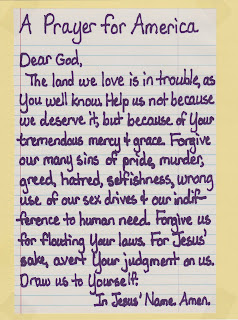 |
| Handmade National Prayer Banner |
Truly prolife solutions. We need them. When will mass shootings and terrorist attacks end?
So many shootings and terrorist attacks have happened in these recent months and years! Disturbed, hate-filled individuals now feel free to enter any setting to do their business. A Bible study. A movie theater. A nightclub. A military base. A school. A shopping mall.
Today, it happened again and it happened in multiple locations, including an apartment, a delicatessen and a university. Six people are murdered, a suspect dead by suicide. Over a dozen people are injured, a couple seriously so. the lives of many families are altered forever. Again, we are trying to process a senseless and insane event. The finger-pointing is beginning. What were the warning signs? Could anything have been done? What was missed? Another suspect, like so many others in mass shootings, talked of feeling like an outsider, rejected, that the world was against him, that people were basically unkind, and that he was fed up and was going "to deal with it." We are, again, talking about guns and mental health. Here we go again!
We Have Become A "Culture of Violence"
One popular talk show host has a segment on her show called "Culture of Violence." This is because reporting on crime and violence has become almost routine. We have become used to crime and violence as the norm. The Investigation Discovery (ID) TV Channel has series called "Wives with Knives," Southern-Fried Homicide," Blood Relatives," "Who the (Bleep) Did I marry?" and more. On the Oxygen TV Channel there is a series called "Snapped." ON HLN there is daily programming called "On the Case." Murders are covered on most of this true crime programming, whether you talk about individual murders, serial murders, or mass murders. Rapes and sexual assaults, which are much underreported, are widely covered on these true crime channels. Many of us may wonder if violence has increased, or if we are simply hearing about it much more because of social media's accountability. These days, thanks to Smartphones and video surveillance cameras, much of what we do is caught on camera. "Caught on Camera" is a series where we can see crimes committed in real-time. Brothers and sisters in Jesus, I know that there are many here that may believe that all this is proof that we are in "the end times" and that "the time of the Anti-Christ and the Mark of the Beast" are upon us. In Fact, I have seen some posts, made by Christians on the Internet, who believe this. But if you read Scripture and the many murders from both cover to cover, have crime and violence not always been with us? What about the ultimate in crime in violence--the betrayal, arrest, crucifixion and death of God the Son?
America & Other Western Countries
If you are an American Christian, you may very likely love to sing, "God bless America." We call the US "the freest country in the world." But as my late stepdad would wonder aloud, "With all our crime, we Americans are paying the price for our great freedom." While we are used to our form of government and not to those in the rest of the Western world, isn't it interesting that we don't hear of so much crime and violence throughout other Western countries? Certainly, crimes are committed in every country but violence does not seem to happen as it does in the US. In many other Western countries, laws regulate gun safety and, in the words of "gun rights" advocates, "disarm the citizenry." I don't want to get into a gun rights debate, but it seems interesting that US rates of murders are so high. While most of us would say that our model of capitalism is closer to the Bible than other Western country's model of socialism, is that so? According the Scripture, the only reason God allowed earthly rulers is because His people would not let Him rule over them. His original plan of government is a Theocracy (His benevolent rule), not Totalitarianism, Monarchy, or even Democracy. And what would He want us to do concerning gun rights and gun ownership in the light of gun-related violence that won't end?
Another Massacre, Same Old Debates
The past weekend, we were shocked and saddened by another bloodbath involving multiple crime scenes. One gunman killed six students and injured thirteen others. Then he ended his own life. Elliot Rodger's apartment, a delicatessen and his university witness and experienced his malevolent rage at the world for his perception of rejection and alienation. He has forever scarred the lives of many, whose lives, thanks to him, will never be the same. I'm sure that most of us have heard the heart-wrenching and impassioned speeches of one grieving father, who took his grief and anger to the cameras. We heard him lash out at "craven politicians who refused to respond to Sandy Hook and to the NRA." He cried, "Why all the talk about gun rights! What about my son's right to live!?" It seems that on the heels of every massacre like this one over the past weekend, I see Second Amendment posts by people asserting their rights to gun ownership and to conceal/carry. On one's Facebook friend's page, her spouse tagged her in a lighthearted post about some gun they owned and were concealing/carrying. Apparently, a comment revealed that she owned one of her own. I saw another post about figures and stats indicating that gun control INCREASES not DECREASES crime (I don't know how accurate or biased those figures are). But these posts were posted right after the weekend of the Santa Barbara massacre. Yes, I know that this massacre also involved knives and many savage crimes involve knives! We're hearing the same old debate on mental health/mental illness and about Elliot Rodger's long history of seeing therapists, since he was eight years old. It seems that his parents did all they could to intervene. According to reports, they found his manifesto and his YouTube videos, took these to the police and did all they could to end the massacre. According to reports, they are currently even more distraught over the deaths of the victims than of the loss of their son! I find something poignant about that. While the public widely supports and unanimously agrees on the need to pray for and support survivors and the families of the victims, I fear that very few support and pray for the family of Elliot Rodgers. Brothers and sisters in Jesus, I hope you will pray for his family who are living in unimaginable grief.
God's Solution?
The Scripture tells us that evil people will get worse and worse. It is nothing that should shock us. It seems that so many of the high-profile mass shooters share (d) some traits in common. They report extreme feelings of rejection by society, of being outcasts and of not belonging anywhere. In his chilling Manifesto and in one video played on CNN, Elliot Rodgers declared that people, especially women, have rejected him and ruined his life. He exclaimed that his life was a "living hell and that he was not going to take it any more." He felt like a second-class outcast and that he was "going to get the popular people who hurt him." His painful feelings clearly morphed to rage, which is anger turned outward. That was combined with depression, as he killed himself, also. As Christians, we know that gun safety laws can curb much violence, preventing murder victims and letting many people live who otherwise would not. But these laws cannot change anyone's hearts. There are many, many Elliot Rodger's among us--people who feel isolated, excluded by others, rejected by them, and that their lives will never get any better. If you know anyone who reports feeling like Elliot Rodgers dis, reach out to him or her, especially if the person is a family member or attends worship services with you. Who knows but that you may be preventing another tragedy?






